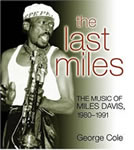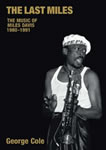Part one in an occasional series that looks at some of the people associated with Miles in the 1980s and who haven’t had the recognition they deserve.
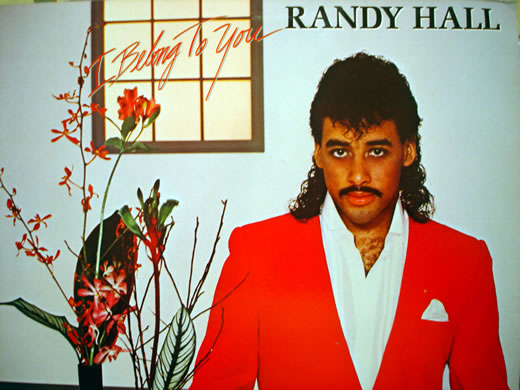
Randy Hall’s orbit crossed Miles’s a number of times during the 1980s, but his role in the music Miles made in the 1980s is often overlooked. Randy Hall is a singer/guitarist/producer, who grew up in Chicago. His first instrument was the piano, but at thirteen, he switched to guitar, taking guitar lessons from British jazz guitarist Peter Budd. Despite Budd’s best efforts, Hall adopted a playing technique similar to Wes Montgomery, whereby the thumb is used as a pick. Even so, Hall can play fast and explosively (if you want evidence of this, check out the opening number “One Phone Call/Street Scenes” on the ESP 2 DVD “A Tribute to Miles.”).
Hall had met Miles’s nephew (and future drummer) Vince Wilburn Jr at kindergarten and the two became life-long friends. Wilburn’s mother Dorothy, was Miles’s sister. When Wilburn heard rumours that Hall was now playing guitar and sounding like Jimi Hendrix, he decided to check out his friend. “I went to see Randy and he just floored me,” recalls Wilburn. The two friends started playing together and at the age of sixteen, joined a local band Time, Space and Distance.
The two young musicians’ musical prowess soon gained them a reputation around Chicago and they did session work for local groups, including The Dells. When Hall and Wilburn were around seventeen, Pete Cosey, who had played in Miles’s band from 1973-1975, began giving the youngsters lessons. “We were doing gigs with Pete, festivals and things like that. Pete would play bass and I would play guitar,” recalls Hall. In 1975, Hall went off to study music at the Berklee College of Music in Boston. When Hall returned to Chicago, he joined a new band called Data, which included Wilburn, bassist Richard Patterson, keyboardist Robert Irving III and saxophonist Glenn Burris. All of these musicians would later form Miles connections, with Patterson becoming the last bassist in a Miles Davis band and the others working on Miles’s comeback album, The Man With The Horn. Irving and Wilburn would also join Miles’s band in the 1980s.
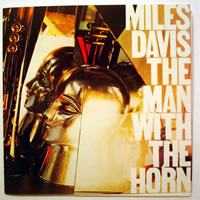
And there were even more remarkable Miles connections with this group of young Chicagoan musicians. Hall, Irving and Wilburn would jam with other local musicians, including bassist Darryl Jones (who joined Miles’s band in 1983) and guitarist Jean-Paul Bourelly, who played on the Amandla album. In 1979, Data disbanded and a new band was formed, AL7, which included Hall, Wilburn, Irving, Burris, bassist Felton Crews (who also joined Miles’s band) and Hall’s sister Saundra, a vocalist.
Although AL7 performed some gigs, their main preoccupation was rehearsing and writing material. They also worked with arranger Tom Washington (known as Tom Tom 84), who had close connections with another local band, Earth, Wind & Fire. Tom Tom 84 recorded several demos with AL7, including a track called “Space,” which had been written by Robert Irving III. Miles often called his sister Dorothy on the phone and took a close interest in his nephew’s musical progress. It was during a call to Dorothy in early 1980 that Miles heard the track “Space” and was gripped by the music. It was this music that finally got Miles to return to the music scene after a five-year break (however, the break wasn’t total – Miles had been involved in a number of aborted musical projects during 1976-80).
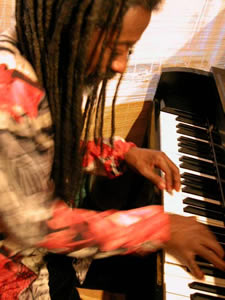
Robert Irving III Photo courtesy and © Robert Irving III
Miles’s record label, Columbia Records, was so excited by the prospect of Miles playing again that they flew four of the AL7 band members – Hall, Wilburn Crews and Irving – from Chicago to New York, booked them in a top-flight hotel and arranged recording sessions. Hall says his reaction to the news that they would be working with Miles was: “Like a dream.” Glenn Burris later joined the four and although he was at many of the sessions, he didn’t play. Instead, the four Chicagoan musicians were joined by a young saxophonist Bill Evans, who had been recommended to Miles by ex-band member Dave Liebman.
The young musicians would work on the music at Miles’s house most days and eventually, they went into the studio and recorded more than a dozen tracks, although Miles didn’t play on any of them at this stage. One of them was “Shout,” a disco-funk track written by Hall, Irving and Burris. Another was “The Man With The Horn,” a tribute ballad to Miles written by Hall and Irving. The tune would not only become the title track for Miles’s comeback album, but it would also become one of the most controversial recordings of Miles’s career, not least because it featured the vocals of Randy Hall, who also played guitar, synthesiser and celeste on the track. “Miles really liked my voice, but I didn’t think I would actually be singing on a Miles Davis record,” recalls Hall. There were plans for Hall to join Miles on-stage and perform “The Man With The Horn,” but this didn’t happen, although Hall performs the song on the ESP 2 DVD.
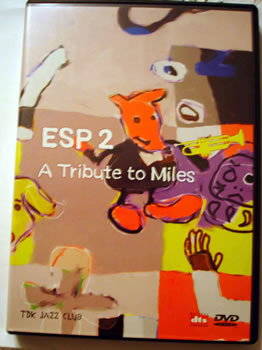
The release of The Man With The Horn gave Hall a lot of exposure and as a result of his singing on the title track, he was invited to join the soul/funk band Pleasure. Even so, Hall kept in touch with Miles and every so often, he would be asked by Miles to compose some songs. One of them was written for The Rolling Stones, but was rejected by the band. But that didn’t stop Miles using the song’s title (but not the music) – for his 1984 album Decoy.
After leaving Pleasure, Hall carved out a successful career as an artist/producer and in 1984, he released a solo album, I Belong to You, produced by Ray Parker Jr (of Raydio and “Ghostbusters” fame). The album included contributions from Irving, Wilburn, Crews and Burris. In 1985, Hall was in Ray Parker Jr’s studio, (Ameraycan) in Los Angeles, recording a follow-up solo album, Love You Like A Stranger. Once again, Crews and Irving were involved in the sessions. Meanwhile, Miles had left Columbia Records after almost thirty years and signed with Warner Bros records, with Warner’s head of jazz Tommy LiPuma given the responsibility of handling Miles’s musical development. During the initial stages, LiPuma was happy for Miles to choose his own musical direction. Miles decided that he wanted Hall to produce his first album for Warner Bros.
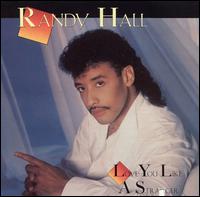
Hall decided to work with a number of people from the Love You Like A Stranger sessions on the new Miles album. One of these was Atalla Zane Giles, who had played guitar, keyboards, bass and sang on the album. Giles was asked to compose, arrange and produce the new album with Hall. Engineer Reggie Dozier was asked to join the project, as were keyboardist Adam Holzman (who later joined Miles’s band), bassist Cornelius Mims, percussionist Steve Reid, Burris and Wilburn. More than a dozen tunes were recorded during the sessions, which took place between October 1985 and January 1986 and the plan was to release an album called Rubberband. “Miles wanted the street thing,” recalls Hall, and so many of the tracks had a raw, funky edge to them (coincidentally, one of the tracks was called “Give It Up,” the same name as a hit tune for Pleasure.).
But when LiPuma heard the Rubberband material, he was unimpressed and the album was left in the can – Miles went on to work with Marcus Miller and record Tutu. Later on, Miles’s performances from a couple of the Rubberband sessions were used to create new tracks on the Doo-Bop album – much to the distress of Hall and Giles. Two tunes from the Rubberband sessions were due to appear on a retrospective set called The Last Word, but even this was abandoned. “I don’t know what it was about Miles, but we always seemed to be jinxed,” says Hall, “but it was a great experience to work with him. I only wish that the things we did together had come out.”
